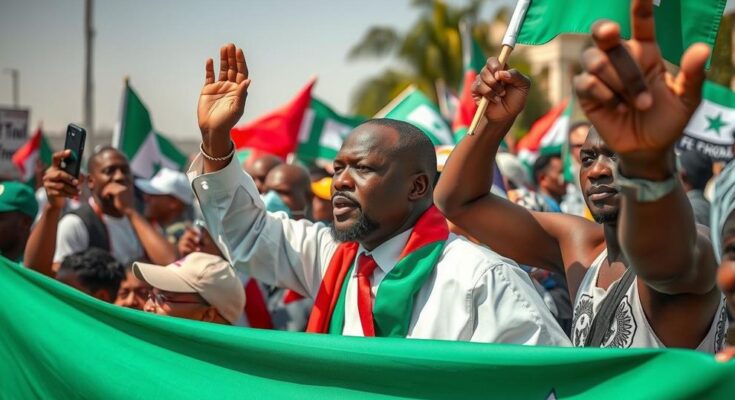Chadian opposition groups are calling for the cancellation of the December 29 elections, claiming extensive boycotts from the populace. Meanwhile, the National Agency for the Management of Elections insists on the integrity of the electoral process, reporting that vote counting is underway. Key opposition figures argue for a new transitional government to promote stability and address the perceived dictatorial tendencies of the current regime.
Chad is currently experiencing political tensions as opposition groups demand the cancellation of the upcoming general elections scheduled for December 29. This follows claims of widespread boycotts from citizens, reflecting discontent with the transitional government’s legitimacy. Assane Bairra, vice president of the National Agency for the Management of Elections (ANGE), has commenced vote counting following recent local, provincial, and parliamentary elections, asserting that the electoral process has remained fair and transparent. Provisional results are anticipated by January 15, but opposition figures contend that actual voter turnout is significantly lower than reported, attributing this to public adherence to boycott calls.
During a press conference, Avocksouma Djona, a spokesperson for the Political Actors Consultation Group (GCAP), claimed that over 90% of registered voters participated in the boycott, citing a desire to resist the continuation of what they perceive as a dictatorial regime under Mahamat Idriss Deby, the son of the late president. Such sentiments have been echoed by Succes Masra, leader of The Transformers party, who advocates for a new transitional phase centered around truth and dialogue to foster stability. While the government asserts that opposition calls are designed to incite chaos, political analysts question whether the elections can realistically proceed under the current climate, which is fraught with allegations of electoral malpractice.
The government’s commitment to conducting the elections and the opposition’s refusal to recognize their legitimacy sets the stage for potential unrest, with the population deeply divided on the future of Chad’s governance. Despite the official narrative of a successful electoral process, dissenting voices persist, reflecting broader issues within Chad’s political landscape that may incite future conflict.
In summary, the situation in Chad remains precarious as opposition parties push for the cancellation of upcoming elections and a new transitional government, citing widespread boycott and demands for genuine political reform. Reports of possible electoral manipulation further complicate the matter, suggesting an ongoing struggle for political power in a nation still grappling with the legacy of authoritarian rule.
“Civilians learned from Chad’s May 6 presidential elections that Deby wants to extend his late father’s long rule.” – Avocksouma Djona
“Chadians are angry because Deby is a dictator who silences all critical voices.” – Avocksouma Djona
“[A new transition] should be marked by truth, dialogue, and reconciliation to lay the foundations of a stable and inclusive political system.” – Succes Masra
“Although the opposition has legitimate claims… it is unlikely that the polls will be annulled as the opposition requests.” – Yamingue Betinbaye
Chad’s political landscape has been unstable since the death of President Idriss Deby Itno in April 2021, which led to Mahamat Idriss Deby assuming power and establishing a transitional government. The upcoming elections are meant to conclude a three-year transition period, but the legitimacy of the process has been challenged by opposition parties. The current political tension is exacerbated by accusations of electoral rigging and widespread calls for boycotts among voters, reflecting deep-seated dissatisfaction with the existing regime. The national electoral agency claims to oversee fair elections, but the opposition remains skeptical, reinforcing a climate of distrust and potential unrest.
In conclusion, Chad’s political climate is tenuous as it approaches the scheduled elections amidst significant calls for boycotts from the opposition. The government’s assurance of a fair electoral process clashes with the narrative of widespread dissatisfaction and claims of electoral manipulation. As political tensions mount, the outcomes of the elections may either exacerbate existing divisions or pave the way for necessary reforms, underscoring the critical need for dialogue and reconciliation among all stakeholders involved.
Original Source: www.voanews.com




